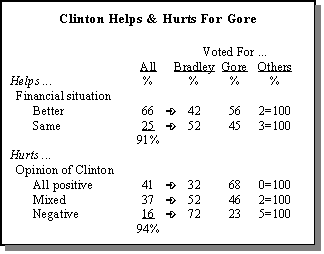GOP Side
– Independent participation in the Republican primary was 10 percentage points higher than in 1988, the last time Granite State Independents had the opportunity to choose between two meaningful primaries.* This was crucial to John McCain’s victory, but it also might have led to Bill Bradley’s defeat. Fully one-quarter of GOP primary participants said they considered voting in the Democratic primary and most would have gone to Bradley, not to Al Gore.
[*Note: Unless otherwise noted, all poll numbers are taken from Voter News Service (VNS) exit poll.]
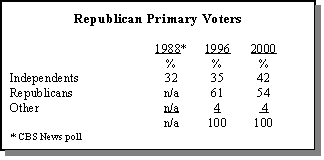
– For voters, a personal sense of the candidates was more decisive than issues. McCain benefitted from his background as a war hero and was regarded as more authentic than George W. Bush, while many voters had doubts about Bush’s depth.
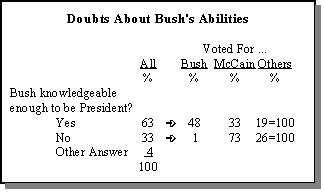
– McCain bested the Texas governor by a large margin among voters looking for a candidate who stands up for his beliefs, and one who is a strong leader. Both qualities were most important to Republican voters. McCain’s military service was important to half of GOP primary voters and that group voted overwhelmingly for the Arizona senator. Fully one-third of exit poll respondents thought Bush might not be well informed enough to be president and 73% of them said they voted for McCain.
Democratic Side
– Women accounted for 62% of the Democratic electorate in New Hampshire, compared to 54% in 1992 and 52% in 1988. Women, along with other core Democratic constituencies, provided the margin of victory for Al Gore. Union support was also a key for the vice president. Union members accounted for one-in-four primary voters, and Gore won 62% of these votes.
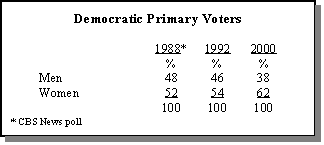
– Bradley’s heart problems hurt his chances for an upset. One-in-five voters said they thought Bradley’s medical condition might interfere with his ability to carry out his duties as president. More than eight-in-ten (85%) of this group backed Gore.
– More than anything else, the former New Jersey senator failed to do what McCain accomplished on the Republican side in convincing voters that he is both more honest and a stronger leader than his opponent. Democrats looking for the stronger leader went two-to-one for Gore.
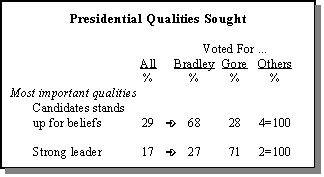
– Gore showed better than Bradley — 70% of those who saw Gore in person voted for him. Only 58% of those who saw Bradley voted for him. Gore also won support from 60% of those who said they followed the debates closely.
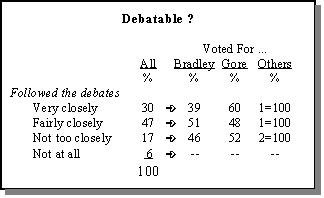
– Bill Clinton both helped and hurt Gore. Democratic primary voters who said they were better off financially voted for Gore, while those who felt no progress backed Bradley. On the other hand, voters with a mixed or negative opinion of the President supported Bradley.
